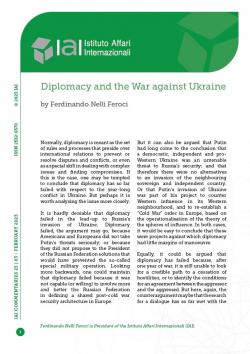Diplomacy and the War against Ukraine
Normally, diplomacy is meant as the set of rules and processes that preside over international relations to prevent or resolve disputes and conflicts, or even as a special skill in dealing with complex issues and finding compromises. If this is the case, one may be tempted to conclude that diplomacy has so far failed with respect to the year-long conflict in Ukraine. But perhaps it is worth analysing the issue more closely.
It is hardly deniable that diplomacy failed in the lead-up to Russia’s invasion of Ukraine. Diplomacy failed, the argument may go, because Americans and Europeans did not take Putin’s threats seriously; or because they did not propose to the President of the Russian Federation solutions that would have prevented the so-called special military operation. Looking more backwards, one could maintain that diplomacy failed because it was not capable (or willing) to involve more and better the Russian Federation in defining a shared post-cold war security architecture in Europe.
But it can also be argued that Putin had long come to the conclusion that a democratic, independent and pro-Western Ukraine was an untenable threat to Russia’s security; and that therefore there were no alternatives to an invasion of the neighbouring sovereign and independent country. Or that Putin’s invasion of Ukraine was part of his project to counter Western influence in its Western neighbourhood, and to re-establish a “Cold War” order in Europe, based on the operationalisation of the theory of the spheres of influence. In both cases, it would be easy to conclude that these were projects against which diplomacy had little margins of manoeuvre.
Equally, it could be argued that diplomacy has failed because, after one year of war, it is still unable to look for a credible path to a cessation of hostilities, or to identify the conditions for an agreement between the aggressor and the aggressed. But here, again, the counterargument may be that the search for a dialogue has so far met with the systematic practice of “fait accompli” by the Russian Federation. This has been demonstrated numerous times: from the occupation by Russian troops of parts of Ukrainian territory, and even more so the annexation to the Russian Federation of the Ukrainian territories not only of the whole Donbass, but also of Kherson and Zaporizhzhia; to Russia’s consistent determination to set clearly unacceptable conditions, such as the request that Kyiv gives up all the territories occupied by Russian troops and renounces to its sovereignty over almost 20 per cent of its territory.
Nevertheless, diplomacy accomplished some minor, and sectoral, but not insignificant results in the course of the first year of the conflict. This has been the case for the agreement between Russians and Ukrainians on a partial exchange of prisoners; and for the temporary solution to allow ships carrying grains, cereals and other food products to leave the Ukrainian ports in the Black Sea and export these products to their final destinations. In both cases, Turkey played a major role, taking advantage of a carefully designed neutrality between the two belligerents.
If one changes perspective and looks at the West’s reaction to Russian aggression, however, the judgment on the performance of diplomacy is substantially different. Putin’s reckless move has strengthened relations as never before between Americans, Europeans and other like-minded countries. As a result, these countries have defined, without hesitation, a common strategy based on an unconditional condemnation of Russia’s invasion of Ukraine, the adoption of heavy sanctions against Russia and a commitment to provide Ukraine with all the assistance it needs to defend itself, offering economic, financial, humanitarian and military aid. In this case, diplomacy has been successful, because, starting from a strong political solidarity with Ukraine, it made possible rapid, multi-pronged and effective collective action.
Diplomacy has worked less well, however, in broadening the international consensus on the condemnation of Russia and assistance to Ukraine from the Western camp to other major players on the world’s stage. Indeed, the West, although it reacted united against the Russian aggression, has failed to engage either China or India or other important international players. Too many governments have preferred not to take sides openly; and have adopted a position of deliberate ambiguity toward Russia, or even, in some cases, helped Russia circumvent Western sanctions. Thus, a significant divide has emerged between a Western world strongly committed to supporting Ukraine and a new Global South unwilling to join the West in this move.
All this is not to conclude that the space for diplomacy is permanently foreclosed with respect to the war against Ukraine. Rather, the time for diplomacy has not yet arrived, unfortunately. Diplomacy, and diplomatic creativity, will certainly be necessary, but only when the aggressor country will finally realise that the political and economic costs of the war are becoming unsustainable, that Ukraine’s territorial integrity is not negotiable, and that a compromise will have to be based on the recognition of the borders that existed before 24 February 2022. Then it will be possible to talk about new arrangements for Ukraine, including the protection of Russian-speaking minorities, an internationally guaranteed autonomy regime for the Donbass, security guarantees for Russia, but also – and above all – security guarantees for a Ukraine destined for a future in Europe, and hopefully perhaps even a new security architecture in Europe in the longer term. Then diplomacy will be able to return to its role.
Ferdinando Nelli Feroci is President of the Istituto Affari Internazionali (IAI).
-
Dati bibliografici
Roma, IAI, febbraio 2023, 3 p. -
In:
-
Numero
23|03




